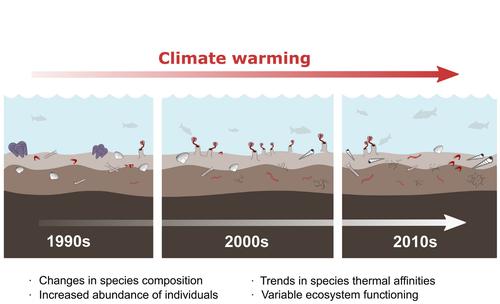当前位置:
X-MOL 学术
›
Glob. Change Biol.
›
论文详情
Our official English website, www.x-mol.net, welcomes your
feedback! (Note: you will need to create a separate account there.)
Multidecadal changes in coastal benthic species composition and ecosystem functioning occur independently of temperature‐driven community shifts
Global Change Biology ( IF 10.8 ) Pub Date : 2024-08-27 , DOI: 10.1111/gcb.17482
Phoebe Armitage 1, 2 , Michael T Burrows 3 , James E V Rimmer 1 , Andrew J Blight 1 , David M Paterson 1
Global Change Biology ( IF 10.8 ) Pub Date : 2024-08-27 , DOI: 10.1111/gcb.17482
Phoebe Armitage 1, 2 , Michael T Burrows 3 , James E V Rimmer 1 , Andrew J Blight 1 , David M Paterson 1
Affiliation

|
Rising global temperatures are often identified as the key driver impacting ecosystems and the services they provide by affecting biodiversity structure and function. A disproportionate amount of our understanding of biodiversity and function is from short‐term experimental studies and static values of biodiversity indices, lacking the ability to monitor long‐term trends and capture community dynamics. Here, we analyse a biennial dataset spanning 32 years of macroinvertebrate benthic communities and their functional response to increasing temperatures. We monitored changes in species' thermal affinities to examine warming‐related shifts by selecting their mid‐point global temperature distribution range and linking them to species' traits. We employed a novel weighted metric using Biological Trait Analysis (BTA) to gain better insights into the ecological potential of each species by incorporating species abundance and body size and selecting a subset of traits that represent five ecosystem functions: bioturbation activity, sediment stability, nutrient recycling and higher and lower trophic production. Using biodiversity indices (richness, Simpson's diversity and vulnerability) and functional indices (richness, Rao's Q and redundancy), the community structure showed no significant change over time with a narrow range of variation. However, we show shifts in species composition with warming and increases in the abundance of individuals, which altered ecosystem functioning positively and/or non‐linearly. Yet, when higher taxonomic groupings than species were excluded from the analysis, there was only a weak increase in the measured change in community‐weighted average thermal affinities, suggesting changes in ecosystem functions over time occur independently of temperature increase‐related shifts in community composition. Other environmental factors driving species composition and abundance may be more important in these subtidal macrobenthic communities. This challenges the prevailing emphasis on temperature as the primary driver of ecological response to climate change and emphasises the necessity for a comprehensive understanding of the temporal dynamics of complex systems.
中文翻译:

沿海底栖物种组成和生态系统功能的数十年变化与温度驱动的群落变化无关
全球气温上升通常被认为是影响生态系统及其通过影响生物多样性结构和功能提供的服务的关键驱动因素。我们对生物多样性和功能的理解很大一部分来自短期实验研究和生物多样性指数的静态值,缺乏监测长期趋势和捕捉群落动态的能力。在这里,我们分析了涵盖 32 年大型无脊椎动物底栖群落及其对温度升高的功能响应的两年期数据集。我们监测物种热亲和力的变化,通过选择它们的中点全球温度分布范围并将其与物种特征联系起来,来研究与变暖相关的变化。我们采用了生物性状分析(BTA)的新颖加权指标,通过结合物种丰度和体型,并选择代表五种生态系统功能的性状子集,更好地了解每个物种的生态潜力:生物扰动活动、沉积物稳定性、养分回收以及高营养级和低营养级生产。使用生物多样性指数(丰富度、辛普森多样性和脆弱性)和功能指数(丰富度、Rao's Q 和冗余度),群落结构随时间变化没有显着变化,变化范围较小。然而,我们发现物种组成随着变暖和个体丰度的增加而发生变化,从而积极和/或非线性地改变了生态系统的功能。 然而,当比物种更高的分类群被排除在分析之外时,测得的群落加权平均热亲和力变化仅微弱增加,这表明生态系统功能随时间的变化与温度升高相关的群落组成变化无关。 。在这些潮下大型底栖动物群落中,驱动物种组成和丰度的其他环境因素可能更为重要。这对普遍强调温度作为气候变化生态反应的主要驱动因素提出了挑战,并强调了全面了解复杂系统的时间动态的必要性。
更新日期:2024-08-27
中文翻译:

沿海底栖物种组成和生态系统功能的数十年变化与温度驱动的群落变化无关
全球气温上升通常被认为是影响生态系统及其通过影响生物多样性结构和功能提供的服务的关键驱动因素。我们对生物多样性和功能的理解很大一部分来自短期实验研究和生物多样性指数的静态值,缺乏监测长期趋势和捕捉群落动态的能力。在这里,我们分析了涵盖 32 年大型无脊椎动物底栖群落及其对温度升高的功能响应的两年期数据集。我们监测物种热亲和力的变化,通过选择它们的中点全球温度分布范围并将其与物种特征联系起来,来研究与变暖相关的变化。我们采用了生物性状分析(BTA)的新颖加权指标,通过结合物种丰度和体型,并选择代表五种生态系统功能的性状子集,更好地了解每个物种的生态潜力:生物扰动活动、沉积物稳定性、养分回收以及高营养级和低营养级生产。使用生物多样性指数(丰富度、辛普森多样性和脆弱性)和功能指数(丰富度、Rao's Q 和冗余度),群落结构随时间变化没有显着变化,变化范围较小。然而,我们发现物种组成随着变暖和个体丰度的增加而发生变化,从而积极和/或非线性地改变了生态系统的功能。 然而,当比物种更高的分类群被排除在分析之外时,测得的群落加权平均热亲和力变化仅微弱增加,这表明生态系统功能随时间的变化与温度升高相关的群落组成变化无关。 。在这些潮下大型底栖动物群落中,驱动物种组成和丰度的其他环境因素可能更为重要。这对普遍强调温度作为气候变化生态反应的主要驱动因素提出了挑战,并强调了全面了解复杂系统的时间动态的必要性。







































 京公网安备 11010802027423号
京公网安备 11010802027423号